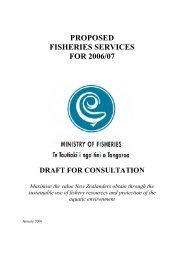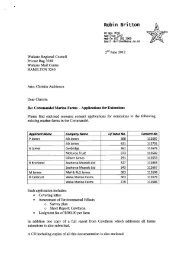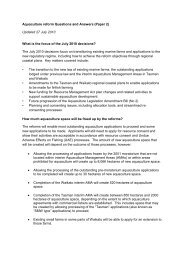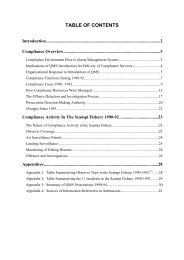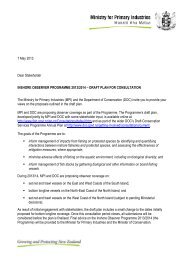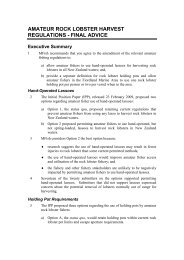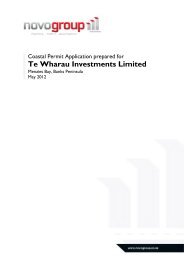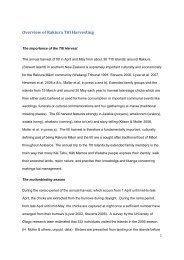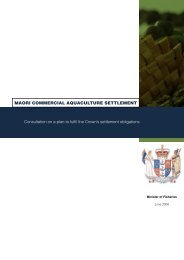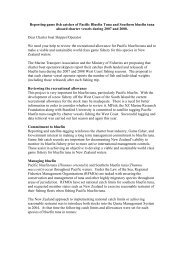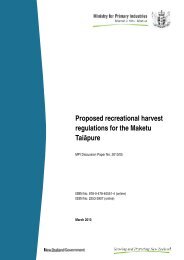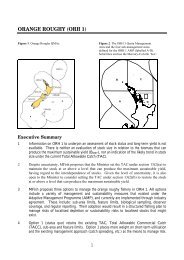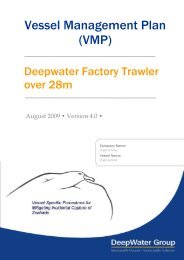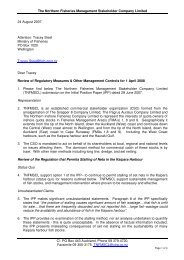Aquatic Environment and Biodiversity Annual Review 2012
Aquatic Environment and Biodiversity Annual Review 2012
Aquatic Environment and Biodiversity Annual Review 2012
You also want an ePaper? Increase the reach of your titles
YUMPU automatically turns print PDFs into web optimized ePapers that Google loves.
AEBAR <strong>2012</strong>: Marine <strong>Biodiversity</strong><br />
11.2.2. Global marine assessment<br />
The biological diversity of the 72% of the planet covered by seawater is a crucial component of global<br />
resource security, ecosystem function <strong>and</strong> to climate dynamics. The Marine <strong>Biodiversity</strong> Outlook<br />
Reports <strong>and</strong> Summaries prepared by UNEP’s Regional Seas Programme for the 10th Conference of<br />
Parties of the Convention on Biological Diversity (CBD) held in 2010 provide the first systematic<br />
overview at a sub-global scale of the state of knowledge of marine biodiversity, the pressures it faces<br />
currently <strong>and</strong> the management frameworks in place for addressing those pressures 26 .<br />
The regional reports reflect a poor outlook for the continuing well being of marine biodiversity, which<br />
faces increasing pressures in all regions from l<strong>and</strong> sourced pollution, ship sourced pollution <strong>and</strong><br />
impacts of fishing. These pressures are serious <strong>and</strong> generally increasing despite measures in place to<br />
address them. They are amplified by predicted impacts of ocean warming, acidification <strong>and</strong> habitat<br />
change arising from climate <strong>and</strong> atmospheric change. Without significant management intervention<br />
marine biological diversity is likely to deteriorate substantially in the next 20 years with growing<br />
consequences for resource <strong>and</strong> physical security of coastal nations.<br />
With respect to fisheries, the main findings of the reports are that in most regions fisheries peaked at<br />
some point between the mid-1980s <strong>and</strong> mid-2000s that catch expansion is not possible in many cases<br />
<strong>and</strong> that increased exploitation levels would lead to lower catch levels.<br />
All regions report increases in shipping at levels which generally reflect annual economic growth. All<br />
regions report progress in the establishment of Marine Protected Areas but current levels of 1.2% of<br />
global ocean surface or 4.3% of continental shelf areas fall far short of the 10% target set by CBD<br />
COP7 in 2004. It is likely to be many years before this target is reached. The figures do not include<br />
some managed fishery areas that have objectives consistent with multiple sustainable use <strong>and</strong> overall<br />
objectives for conservation but even if these are taken into account the proportion managed with<br />
objectives that explicitly address sustainability of biodiversity or ecosystem processes is inadequate.<br />
The need to plan <strong>and</strong> implement ecosystem scale <strong>and</strong> ecosystem-based management of the seas is<br />
urgent.<br />
After many years of international negotiations on the need to strengthen the science‐policy interface<br />
on biodiversity <strong>and</strong> ecosystem services at all levels, more than 90 governments (including New<br />
Zeal<strong>and</strong>) agreed in April <strong>2012</strong> to officially establish the Intergovernmental Science-Policy Platform<br />
on <strong>Biodiversity</strong> <strong>and</strong> Ecosystem Services (IPBES) 27 . It will be a leading global body providing<br />
scientifically sound <strong>and</strong> relevant information to support more informed decisions on how biodiversity<br />
<strong>and</strong> ecosystem services are conserved <strong>and</strong> used around the world.<br />
The United Nations Conference on Sustainable Development (UNCSD), also known as the Rio+20<br />
Conference (June 2011) 28 had a strong sustainability focus <strong>and</strong> generated an outcome document<br />
entitled "the future we want" which had a section on oceans (para 158 - 177) including:<br />
• Support for the Regular Process of Global Reporting <strong>and</strong> Assessment of the State of the<br />
Marine <strong>Environment</strong> established under the General Assembly <strong>and</strong> looked forward to the<br />
completion of the first global integrated assessment of the state of the marine environment by<br />
2014 29 .<br />
26 UNEP (2003) Global Marine Assessments: a survey of global <strong>and</strong> regional marine environmental assessments<br />
<strong>and</strong> related scientific activities. UNEP-WCMC/UNEP/UNESCO-IOC. 132p available online at www.unepwcmc.org/resources/publications/ss1/GMA_<strong>Review</strong>.pdf<br />
27 http://www.iucn.org/what/<br />
28 http://sustainabledevelopment.un.org/futurewewant.html Rio +20 outcome document<br />
29 Integrated assessment of the state of the marine environment by 2014.<br />
http://www.un.org/depts/los/global_reporting/Santiago_Regular_Proceess_Workshop_Presentations/GRAME_<br />
Outline_of_the_First_Integrated_Assessment_Report.pdf<br />
237



